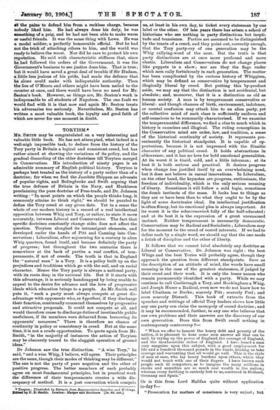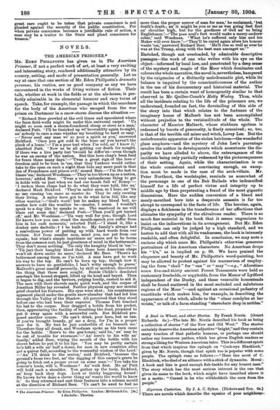Mn. SMITH may be congratulated on a very interesting and
valuable little book. He has not attempted, what indeed is a well-nigh impossible task, to deduce from the history of the Tory party in Britain a logical and consistent creed, but has rather aimed at showing the variations of its policy, and the gradual discarding of the older doctrines till Toryism merged in Conservatism. His introduction of ninety pages is an admirable summary of English political history. Toryism is perhaps best treated as the history of a party rather than of a doctrine; for when we find the Jacobite Shippen an advocate of popular rights, and Bolingbroke and Swift arguing that the true defence of Britain is the Navy, and Huskisson proclaiming the pure doctrine of Free-trade, and Dr. Johnson writing : "In most points on which the people thinks long, it commonly attains to think right," we should be puzzled to define the Tory creed at any given date. Yet in a sense the whole of our modern history is a record of a real intellectual opposition between Whig and Tory, or rather, to state it more accurately, between Liberal and Conservative. The fact that specific doctrines constantly change sides does not affect the question. Toryism sloughed its intransigent elements, and developed under the hands of Pitt and Canning into Con- servatism; Liberalism, after sojourning for a century in alien Whig quarters, found itself, and became definitely the party of progress ; but throughout the two centuries there is somewhere at the back of parties a real conflict, of tem- peraments, if not of creeds. The truth is that in England the "natural man" is a Tory. It is a policy built up on the prejudices and traditions which go with the soil, and on racial character. Hence the Tory party is always a national party, with ite roots deep in the national life. But if it starts with this advantage, it is seriously handicapped by being unable to appeal to the desire for advance and the love of progressive ideals which education brings to a people. As Mr. Smith well pats it, "such a party must always compete at great dis- advantage with opponents who, ex hypothesi, if they discharge their function, continually commend themselves by progressive and attractive proposals. It could not compete at all, and would therefore cease to discharge duties of inestimable public usefulness, if its members were debarred from borrowing its opponents' measures." There is therefore no chance of continuity in policy or consistency in creed. But at the same time, it is not a crude opportunism. To quote again from Mr. Smith, " in the majority of instances the action of Toryism may be obscurely traced to the sluggish operation of ground ideas."
Dr Johnson saw the true distinction. "A wise Tory," he said, "and a wise Whig, I believe, will agree. Their principles are the same, though their modes of thinking may be different." The one is not the party of pure negation and the other of positive progress. The better members of each probably agree on most fundamental principles, but in practical work the difference of their temperaments creates a wide dis- crepancy of method. It is a just convention which compels
T Illustrated by Extracts from Representative Speeches and Writing& &Idled by F. E. Smith. London: Harper and Brothees • [8s, ed. net.]
label or the other. Of late years there has arisen a school of historians who see nothing in party distinctions but inepti- tude and transience. Parties are assumed to be distinguished by the tenets of a creed, and they point out, correctly enough, that the Tory party-my of one generation may be the Whig rallying-word of the next. But the truth is that party distinctions are at once more profound and more elastic. Liberalism and Conservatism do not change places like puppets in a show; nor are they the flags under which men rally fortuitously in each generation. The matter has been complicated by the curious history of Whiggism, which may be defined as conservative by temperament and illogically liberal by creed. But putting this by-product aside, we may say that the distinction is not accidental, but absolute ; and, moreover, that it is a distinction as old as human society. A man is by temperament conservative or liberal : and though chances of birth, environment, indolence, or mental confusion may attach him to an alien party, yet the collective mind of each class is sufficiently uniform and self-conscious to be summarily characterised. If we examine the temperamental difference, we find a clue to much which in history is causeless and illogical. The ruling conceptions in the Conservative mind are order, law, and tradition, a sense of the historical continuity of society. It represents pre- eminently the historical standpoint. It is capable of op- portunism, because it is not impressed with the Sinaitio character of any political creed. It holds abstractions in abhorrence, and it has no love for bold emotional generalities. At its worst it is timid, cold, and a little inhuman ; at its best it is both serious and practical. It desires progress when change has justified itself by an overwhelming need, but it does not believe in casual innovations. In Liberalism, on the other hand, the keynotes are progress, enthusiasm, the freedom of individuality, which is the only serious meaning of liberty. Sometimes it will follow a cold logic, sometimes
the dumb instincts of the mass. It looks less to things as they are or have been than to what they ought to be by the light of some doctrinaire ideal. Its intellectual justification is often flimsy, but its emotional plea is always important. At its worst it is the sektocirmerisch folly of the half-educated ;
and at its best it is the expression of a great unreasoned instinct. Neither temperament is necessarily democratic. Conservatism may be Radical and Socialistic ; Liberalism may for the moment be the creed of vested interests. If we had to define each by a single word, we should say that the one made a fetish of discipline and the other of liberty.
It follows that we cannot label absolutely any doctrine as Liberal or Conservative. Dr. Johnson was right : the beat Whigs and the best Tories will probably agree, though they approach the question from different standpoints. Save as the description of an attitude of mind, the words have small meaning in the case of the greatest statesmen, if judged by their creed and their work. It is only the lesser names who
remain permanently identified with a party. While we may continue to call Castlereagh a Tory, and Rockingham a Whig, and Joseph Hume a Radical, even now we do not know how to label Chatham or Burke; scarcely Pitt ; scarcely Peel ; and soon scarcely Disraeli. This book of extracts from the speeches and writings of official Tory leaders shows bow little any one party can claim the monopoly of sound doctrine ; and it may be recommended, further, to any one who believes that our own problems and their answers are the discovery of our own generation. Does this from Swift recall nothing in contemporary controversy I)—
" When we offer to lament the heavy debt and poverty of the nation, it is pleasant to hear some men answer all that can be said, by crying up the power of England, the courage of England, and the inexhaustible riches of England. I havb heard a man very sanguine upon this subject, with a good employment for life and a hundred thousand pounds in the hinds, bidding us take courage and warranting that all would go well. This is the style of men at ease, who lay heavy burdens upon others, which they would not touch with one of their fingers. I have known such people such ill computers, as to imagine the many millions in stocks and annuities are so much real wealth in the nation; whereas every farthing is entirely lost to us, scattered in Holland, Germany and Spain."
Or is this from Lord Halifax quite without application
to-day P-
" Prosecution for matters of conscience is very unjust ; bti
great care ought to be taken that private conscience is not pleaded against the security of the public constitution. For when private conscience becomes a justifiable rule of action, a man may be a traitor to the State and plead conscience for treason."























































 Previous page
Previous page